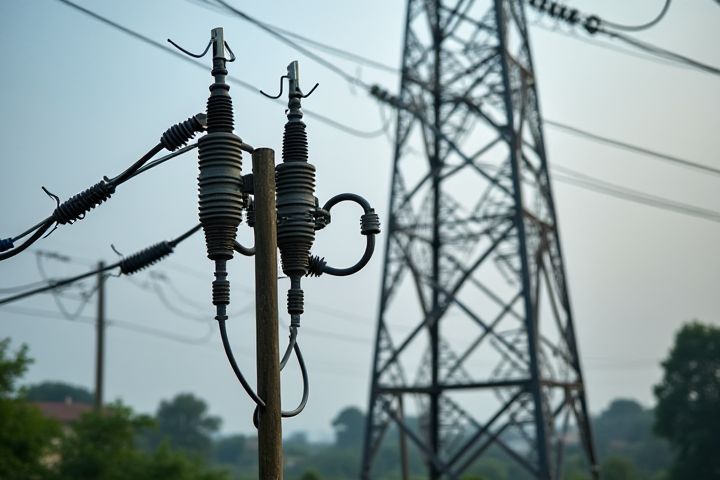
Nigeria's electricity supply system is characterized by a mix of thermal, hydroelectric, and renewable energy sources, yet faces significant challenges in reliability and access. The Nigerian Electricity Regulatory Commission (NERC) oversees the sector, aiming to enhance efficiency and attract investment. Despite an installed capacity of over 13,000 megawatts (MW), actual generation often falls short due to infrastructure deficits, operational inefficiencies, and inadequate gas supply. You may encounter frequent power outages, particularly in rural areas, where less than 50% have reliable access to electricity. Efforts are ongoing to expand the grid and facilitate off-grid solutions, promoting solar energy as a viable alternative for improving electricity access in underserved regions.
Frequent power outages
Nigeria's electricity supply system is plagued by frequent power outages, significantly impacting daily life and economic activities. The country's generation capacity, primarily derived from natural gas and hydroelectric sources, often falls short of meeting peak demand due to infrastructural challenges and inadequate maintenance. Rural areas, in particular, suffer from unreliable service, with many residents relying on alternative energy sources like generators and solar systems. To improve the electricity supply, Nigeria must invest in modernizing its power grid and enhancing the efficiency of existing facilities.
Limited national grid coverage
Nigeria's electricity supply is heavily affected by its limited national grid coverage, which restricts access to reliable power in many regions. Only about 50% of the population connects to the national grid, leaving vast areas dependent on alternative energy sources like generators and solar power. This situation results in inefficiencies and increased energy costs, particularly in rural communities. Improving the national grid infrastructure and expanding access through decentralized energy solutions could enhance electricity reliability and foster economic development in Nigeria.
High generator usage
In Nigeria, high generator usage is a prevalent response to the inconsistent electricity supply, with many households and businesses relying on diesel and petrol generators for power. This dependence highlights the challenges within the country's energy infrastructure, where inadequate grid electricity access leaves millions without reliable options. The economic implications are significant, as the cost of fuel and maintenance for generators adds financial strain on consumers, while also contributing to environmental concerns due to emissions. To improve electricity access, investments in renewable energy sources like solar power and infrastructure upgrades are crucial for sustainable development.
Privatization of power sector
The privatization of Nigeria's electricity supply has significantly transformed the power sector, attracting both local and international investments. The establishment of distribution and generation companies has aimed to enhance efficiency and reliability in electricity provision. As a result, consumers are expected to experience improved service delivery and reduced energy costs. By fostering competition among private operators, Nigeria seeks to expand access to electricity and stimulate economic growth throughout the nation.
Inadequate infrastructure
Inadequate infrastructure is a significant barrier to reliable electricity supply in Nigeria, hindering economic development and daily living standards. Power generation capacities remain low, often relying on outdated plants and insufficient transmission networks, which leads to frequent outages. The lack of investment in renewable energy sources further exacerbates the situation, limiting access to clean and sustainable electricity for millions. Addressing these infrastructure deficits is crucial for improving energy distribution and fostering an environment conducive to growth and innovation.
Recent tariff adjustments
Recent tariff adjustments in Nigeria's electricity supply sector have sparked significant discussions among consumers and stakeholders. The new pricing structure aims to balance the financial sustainability of electricity providers while addressing the affordability for consumers. These adjustments are crucial for improving the aging infrastructure and enhancing service delivery across the country. By understanding these changes, you can better navigate your electricity expenses and advocate for improved energy services in your community.
Dependence on fossil fuels
Nigeria's electricity supply heavily relies on fossil fuels, primarily natural gas and crude oil, which dominate the energy mix. This dependence raises concerns about environmental sustainability and the country's energy security, as fluctuations in global oil prices can impact supply stability. Furthermore, Nigeria faces challenges like inadequate infrastructure and frequent power outages, exacerbated by reliance on aging thermal power plants. Transitioning to renewable energy sources like solar and wind could help diversify the power generation landscape and reduce carbon emissions while enhancing energy independence.
Renewable energy potential
Nigeria has immense renewable energy potential, utilizing abundant resources such as solar, wind, hydro, and biomass. Solar energy, particularly, is prominent due to the country's geographical position, receiving an average of 5-7 hours of sunlight daily. Investment in these renewable resources not only aims to enhance electricity supply but also addresses energy accessibility in rural areas, reducing dependence on fossil fuels. By focusing on renewable energy, Nigeria seeks to create a sustainable energy future, stimulate economic growth, and improve environmental conditions.
Transmission constraints
Electricity supply in Nigeria faces significant challenges due to transmission constraints that hinder the efficient distribution of generated power. The aging infrastructure and limited transmission capacity contribute to frequent outages and an unreliable grid, affecting both residential and industrial users. Improving the transmission network involves upgrading existing lines and investing in new technologies to enhance capacity and reliability. By addressing these constraints, the Nigerian electricity sector can better meet the growing demand and support economic development.
Government energy policies
The electricity supply in Nigeria is significantly influenced by government energy policies aimed at enhancing infrastructure and promoting investment in the power sector. Recent initiatives, such as the Renewable Energy Master Plan, seek to diversify energy sources, focusing on solar, wind, and biomass technologies to improve sustainability. Regulatory frameworks like the Nigerian Electricity Regulatory Commission (NERC) play a crucial role in ensuring fair pricing and fostering competition among power providers. Effective implementation of these policies can lead to increased access to electricity, ultimately boosting economic growth and improving the quality of life for citizens.
